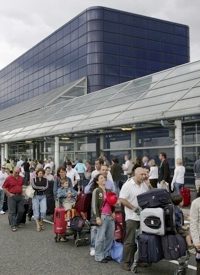
As U.S. airport security measures tighten, squeezing every last ounce of dignity out of law-abiding travelers, even European officials have had enough. Oklahoma’s NewsOn6.com carried Thursday’s AP report that British Airways Chairman Martin Broughton “accused the U.S. of demanding completely redundant security checks at airports, such as removing shoes and separate examinations of laptop computers.”
“Europe should not have to kowtow to the Americans every time they want something done to beef up security on U.S.-bound flights.”
The owner of Heathrow agreed with Broughton, as did the British pilots’ union and several European airlines.
That says a lot coming from a continent with the ubiquitous security camera, but, hey, it seems even Brits have a limit. AP continued with Europeans’ complaints that the U.S. imposed unnecessary and overly intrusive air travel security measures, calling on the Obama administration Wednesday to re-examine policies ranging from X-raying shoes to online security checks for Europeans.
The European Union challenged the U.S. requirement for European travelers to have online checks before boarding U.S.-bound flights, claiming the system is burdensome and it’s uncertain how long personal data is stored and used. Europeans aren’t currently required to have visas to enter the U.S.
The TSA responded with this statement: “The U.S. works closely with our international partners to ensure the best possible security. We constantly review and evolve our security measures based on the latest intelligence.”
But some European airlines, including the popular Virgin Atlantic, agreed that airport security is too time-consuming and they want it reevaluated. Complaints are that security measures are redundant.
AP’s article notes, “Britain’s Aviation Minister Theresa Villiers said the government planned to give airport managers more freedom in determining how to meet security goals.”
The controversy, however, goes beyond the inordinate amount of time required to clear security, or redundancy in measures.
The issue has reached the point known in the stock market as resistance, or, when a stock has reached a price at which the market resists any increase. People are resisting increased levels of outrageous security intrusions, at least as far as how much is enough and how much delay can be tolerated.
One argument frustrated travelers posed is that if technology is so advanced, and it could detect anything potentially dangerous, why are they required to remove clothes just for some TSA employee to make sure?
So said Donald Smith, 48, of Providence, Rhode Island. “I actually just flew in last night. I think the whole process has gotten slightly out of hand. I appreciate the concern, but for things like taking off shoes — shouldn’t the machines be able to detect anything that could be potentially dangerous?”
It is hoped by some that airline companies will intervene in order to protect their customer base. Heck, even the pilots are fed up.
On this side of the pond, an American sparked debate last week in Memphis. ExpressJet Airlines pilot Michael Roberts refused to submit to the body scanner, then the requisite pat-down, sparking attaboys from all over the country for his resolve.
The action may have jeopardized his job, but it reflects the attitude that some Americans, as well as Europeans, have indeed had it.
Photo: Passengers wait outside the North Terminal at Britain’s Gatwick Airport in this Aug. 10, 2006 file photo following a secutity alert which closed European airspace: AP Images



